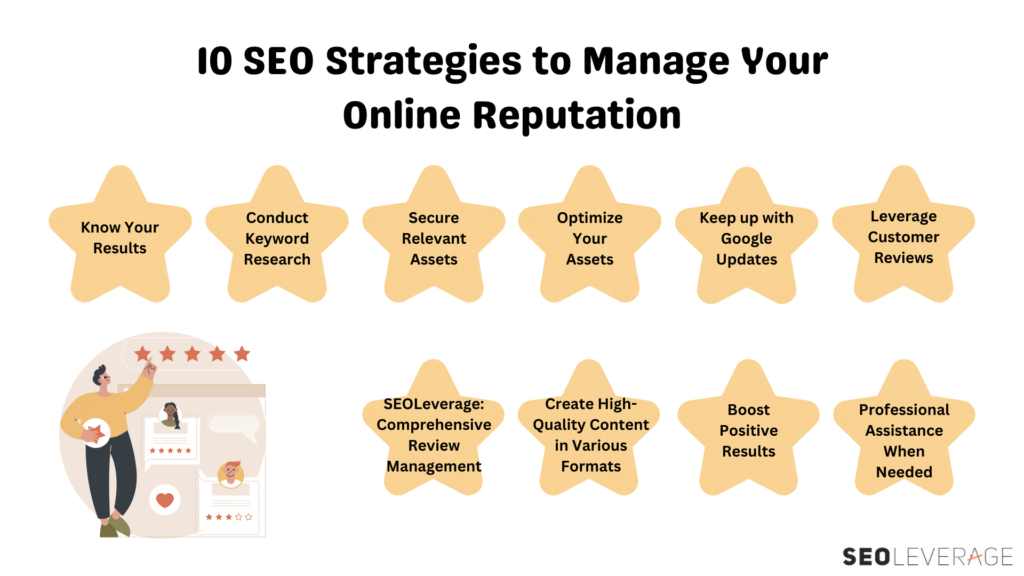Did you know your online reputation can make or break your business? When potential customers search for your brand or services, what they see on the search engine results pages (SERPs) can greatly influence their perception of your company. That's where the power of SEO for reputation management comes into play.
By understanding and implementing effective SEO strategies, you can control how your brand is perceived online, boost positive search results, and mitigate the impact of negative feedback.
In this comprehensive guide, we will explore the importance of SEO for reputation management and provide you with actionable strategies to build and protect your online image.
Key takeaways:
- SEO lays the groundwork for effective online reputation management (ORM).
- A strong online presence can mitigate the impact of negative feedback.
- Proactive SEO strategies are essential for maintaining a positive brand image.
Table of Contents
SEO vs. ORM: The Dynamic Duo
To understand the importance of SEO in reputation management, it's essential to differentiate between SEO and Online Reputation Management (ORM). SEO is the continuous process of optimizing your website and other digital assets to improve visibility in search engine rankings. It involves various strategies such as keyword research, on-page optimization, link building, and content creation.
On the other hand, ORM focuses specifically on managing and influencing the narrative surrounding your brand online. This is where the concept of search engine reputation management (SERM) comes into play. It involves activities like monitoring online mentions, generating positive reviews, and addressing negative feedback. While SEO and ORM are distinct, they work synergistically to shape your online reputation.
Within the intricate interplay of SEO and ORM lies the pivotal role of SEOLeverage, a team of SEO experts adept at bridging the gap between these two critical areas. SEOLeverage offers an array of features tailored to both enhance SEO optimization and fortify online reputation management, positioning it as an indispensable asset for businesses striving to uphold a positive brand image.
Why ORM Matters in the Digital Era
Nowadays, ORM is no longer optional; it's a necessity. A study conducted by Trustpilot revealed that a staggering 90% of consumers would avoid doing business with a company that has a bad online reputation.
Negative news and reviews can have a significant impact on consumer perception and ultimately result in lost business opportunities. Your search results shape the perception of your brand, and where you rank matters. In fact, statistics from FirstPage show that ranking on top of SERPs in your niche generates 39.8% CTR rates. That’s a massive traffic share that highlights the importance of managing your online reputation effectively to ensure positive search rankings and visibility.
While you cannot control what others say about your brand, implementing SEO and ORM strategies allows you to influence your search results, decrease the prominence of negative content, and protect your overall reputation.
10 SEO Strategies to Manage Your Online Reputation
Now that we understand the importance of SEO for reputation management, let's delve into ten effective strategies that can help you build and protect your online image:
1. Know Your Results
Take control of your online reputation by auditing and understanding your search results. Conduct a search for your brand or company name and assess what appears on the SERPs. Consider the following questions:
- Is your website ranking? What is its position?
- Do you have any other owned assets on the first page of search results? Where do they rank?
- Are there any third-party articles or websites ranking for your brand? Are they positive, negative, or neutral?
Understanding your search results provides valuable insights that guide your SEO and ORM strategy. If negative reviews or news dominate your results, or if your owned assets don't show up for your target keywords, it's crucial to identify these issues before implementing remedial actions. This knowledge also helps you gain context for your overall online reputation.
2. Conduct Keyword Research
This is a fundamental aspect of SEO and reputation management. While your brand name is an obvious keyword, it's essential to brainstorm other relevant keywords that potential customers might use to find your business.
Explore suggested and related searches to identify keywords related to your industry, services, or team. Additionally, consider terms associated with negative news or reviews about your brand. Conducting thorough keyword research lets you optimize your content and digital assets more effectively.
3. Secure Relevant Assets
Securing relevant assets is crucial for both SEO and ORM. Ensure that you have secured relevant domain names, social media profiles, and automatically-generated profiles such as Google My Business listings or knowledge panels.
By securing additional domain names related to your business, you can create websites for executives, organizations within your company, or client testimonials – all of which can be leveraged for ORM purposes. Establish a consistent username across all social media platforms and build out each profile as thoroughly as possible. Claim and optimize automatically-generated profiles to ensure accurate information and maximum visibility.
4. Optimize Your Assets
Once you have secured your digital assets, it's time to optimize them. Website optimization, in particular, plays a crucial role in both SEO and reputation management. Focus on improving user experience by making your website navigable, providing relevant information, and ensuring optimal performance.
Address key factors like page speed, mobile-friendliness, and website content. Aim for fast-loading pages, as slow-loading websites tend to experience higher bounce rates and lower rankings. Optimize your website for mobile devices as they account for a significant portion of website traffic. Create informative and engaging content that addresses user queries and provides value. Remember to optimize your social media profiles by using consistent usernames, completing all profile sections, and maintaining an active and engaged presence.
5. Keep up with Google Updates
Google frequently updates its algorithms to enhance user experience and provide more accurate search results. Staying informed about these updates is crucial for maintaining an effective SEO strategy and understanding any sudden changes in your search rankings.
The Page Experience update, for example, focused on improving page loading speed and introduced new features to Google Search Console. By keeping up with Google's updates, you can ensure that your SEO tactics remain aligned with best practices and adapt to any algorithm changes.
6. Leverage Customer Reviews
Customer reviews impact your online reputation and SEO efforts. Research shows that over 84% of consumers read online reviews to learn more about a business. Positive reviews can boost your brand's credibility and trustworthiness, while negative reviews can tarnish your reputation.
Actively solicit feedback from customers and employees to increase the number of reviews on platforms like Google. Responding to negative reviews demonstrates your commitment to resolving issues and improving customer experience. Incorporate customer reviews and feedback on your website, newsletter, and social media profiles to enhance transparency and credibility.
7. Utilize SEOLeverage for Comprehensive Review Management
In the digital realm where customer reviews can make or break a brand's reputation, SEOLeverage offers a comprehensive suite for monitoring, managing, and positively influencing online perceptions through adept review management. It not only enables businesses to stay attuned to customer feedback across various platforms but also facilitates timely and constructive responses, demonstrating a commitment to customer satisfaction.
By integrating SEOLeverage, companies can harness the power of reviews to strengthen their online presence, with analytics that provides insights into customer sentiment, guiding strategic improvements and reinforcing a positive brand image in a rapidly changing world.
8. Create High-Quality Content in Various Formats
Content is a powerful tool for shaping your online reputation and boosting your SEO efforts. High-quality content that is informative, unique, and valuable establish your brand as an authority in your industry.
Develop a comprehensive content strategy that includes written articles, videos, images, and infographics. Answer common customer questions, provide unique perspectives, address industry trends, and highlight your expertise. Regularly publish content on your website, blog, and social media platforms to enhance your online presence and engage your audience. Remember, quality is key – prioritize providing valuable content over sheer quantity.
9. Boost Positive Results
To effectively manage your online reputation, you need to boost positive search results while mitigating the impact of negative content. In addition to optimizing your owned assets, leverage positive earned media and press coverage to increase visibility. Share positive articles and coverage on your social media profiles, website, and newsletter.
Encourage clicks and engagement to improve the ranking and prominence of positive content. By amplifying positive results, you can overshadow negative search results and portray a more accurate and positive image of your brand.
10. Seek Professional Assistance When Needed
Sometimes, managing your online reputation requires professional expertise. If negative results dominate your search results or you are facing a reputation crisis, consider consulting an SEO and ORM firm.
Professionals can conduct a thorough audit of your search results, develop a tailored digital reputation strategy, and guide you through the process of reclaiming your online narrative. Whether you need assistance in navigating a reputation crisis or want to improve your overall online presence, experts can provide valuable insights and effective strategies.

Elevate Your SEO Reputation Management With SEOLeverage
For businesses ready to elevate their SEO and reputation management to new heights, SEOLeverage emerges as a highly recommended partner. SEOLeverage not only simplifies the complex landscape of digital marketing but also ensures that your efforts in SEO and online reputation management are cohesive, impactful, and aligned with your business objectives, inviting readers to consider this powerful tool as a cornerstone of their digital strategy.
Your online reputation is an ongoing effort that needs constant monitoring, adaptation, and optimization. By prioritizing your brand's online image and leveraging the power of SEO, you can establish a strong reputation, build trust, and secure a competitive advantage.

